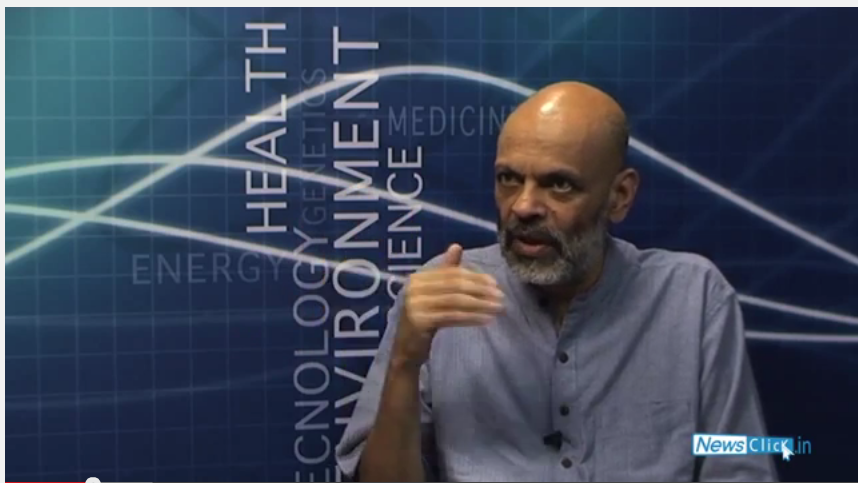Ebola Showing up the Global Public Health System
The Ebola epidemic raging in various parts of Africa has seen over 2000 people already killed by the deadly virus. As the world struggles to deal with and contain further spread of the disease (which has no known cure),we speak to Dr. Satyajit Rath, National Institute of Immunology, New Delhi, about the reasons for and fallout of the epidemic. What are the chances of the disease spreading even further? Why can't this Ebola outbreak be contained given that the disease has been known for more than 20 years? Can the epidemic be blamed on the inadequacy of the public health care systems in Africa? Why is there no vaccines or cure for this disease and how complicit are the drug companies who have preferred to concentrate on developing cures for diseases of the affluent? Is the global health care system failing the poor and the less economically developed countries?

Rough Transcript:
Prabir Purkayastha (PP): Hello and welcome to Newsclick. Ebola is now sweeping through West Africa more than thousand have died and said that more than two thousand have been affected the official figures. The actual figures could be much higher. To discuss these today we have Dr. Satyajit Rath from NII. Welcome Satyajit.
Satyajit Rath: Thank you.
PP: Now, Ebola has been known to be dangerous. It has been declared now an epidemic by WHO of serious concern and so on. Do you think it has a chance of becoming pandemic in Africa?
SR: Clearly, it is a major outbreak. Think about this way regardless whether we have always learnt about every case of Ebola or not. All sudden done this is in interior of Africa, rural Africa, forest associate, through communities from where reporting also may be somewhat under reported. Since 70s when Ebola was first identified until last year I think our recorded deaths of Ebola have been as many as last six years. So clearly, what is happening today is usual. Despite all caveats. How far is this news spread equally, clearing spreading. Even though it started from contiguous border area so it is not surprising that it spread to one or two countries. It has now spread to Algeria where there have not been large numbers of deaths. Some deaths have been reported from Algeria. So it is spreading. That's said, the transmission of Ebola like many other things about Ebola is something of mystery. We know that body secretions, exposure to body secretions is associated with both with infection. But it does not seem to be as easy to catch Ebola for e.g. as perhaps to catch influenza. There is not good evidence may be this is lack of knowledge, there does not seem to be good evidence for example transmitted by coughing and sneezing. Some more contact of some sort of body fluid for instance why is it so, what is the mechanism all unclear and as a result is possible epidemiology to build models in which transmissions if not really easy then the cultural responses of human community in containment will tend to trump transmission and will lead to cessation of outbreaks before they become widespread. On the other hand, in terms of scaremongering it is perfectly possible to make the other argument, which is that so many people are dying, they never died before so maybe this is a strain of Ebola that we have not seen before and may be it is going to spread. The relative spread does not seem to support scaremongering even in these affected countries so far. But this is a general problem with emerging infections constantly. We may hit tomorrow a virus that we have a no experience of and it may spread like wild fire amongst us and infecting half of us. It is possible. Ebola has cousin. Marbore virus for example is a cousin of Ebola. There are other Ebola relatives in sub-Saharan Africa.
PP: One part is as you said other countries have Ebola earlier, these countries have not seen Ebola outbreaks before. Do you think that's one of the reason it took longer to catch it that it didn't recognize Ebola that's why it spread before it could be caught.
SR: Sporadic enough that even in communities in Zaire in Congo for example where the first case occurred in fact along Ebola river that's why it is called Ebola virus. These are areas where there are so many causes of hemorrhagic fevers that diagnosing Ebola has never been easy or straightforward. So while in formal terms it is possible I would be surprised if it is a major contributor to catching it late as it were. I think it is simply an outbreak in more populous areas than many of the previous outbreaks which have been in really small forest associated communities and spread has happened.
PP: Do you think it also the fact that these countries concerned that health systems are not strong. Is that one of the reasons that it spread in this form.
SR: I will make a specific response and a general response. They might seem at odds with each other, which I am going to argue they are not. Specific response is I don't think so because neither in the Congo nor in the couple of other countries the region where outbreaks have occurred in past thirty-five years. Has been there this level of spread and we would be fooling ourselves if we thought that the public health care delivery systems in those countries were or are better than the current countries that are affected. On the other hand, I can make a very general argument which is, is it that these kinds of outbreaks when they occur in countries where the public health care delivery system is poor have a much higher chance of spreading? Absolutely, yes. and that I think is absolutely important point for us that even this outbreak if the public health-care systems have been better, if economic situations have been better, if education levels have been better. If communities had been better off not simply in financial terms but with everything that makes us human communities containments would have been faster.
PP: If you look at disease in general then Ebola, Marbore virus these are all known to be extremely dangerous. Why is the public health system not developed medicines for or vaccines for these kinds of diseases.
SR: The two issues I think we should keep in mind. Number one, developing anti-viral drugs is always been difficult. Despite all the efforts put into the influenza virus for e.g. there are not many Tamiflu cousins out there. So there is scientific technological problem that we need to keep in mind. But there is a deeper more techno-economic system related issue which is the publicly funded research systems create knowledge. But the systematic exploitation of that knowledge to make a technology, to optimize it small incremental tweaks as engineers optimize technologies and to test it rigorously in regulatory appropriate terms and to put it out there so that it’s available, today globally including over the past years in India which for a while stood apart from it has by common consent given it over to the pharmaceutical sector, and this is not to call the pharmaceutical sector names, all said and done the whole point of a private company is to make profit. They will of course make their calculations, and their calculations are very straightforward. If we can develop a drug on some condition that is fairly widespread or we can pursue people that it is fairly widespread amongst people who can afford to pay fairly high prices and that will not lead to cure but only to amelioration so that they would need to take it for a long time if not for the rest of their life … that’s profit! The logic of the capitalist market place departs from the public interest and that’s where states must intervene far more emphatically and far more effectively.
PP: it’s interesting what you say because as you know W.H.O. and UNICEF together have payed a huge amount of money so that big pharmaceuticals can produce vaccines, because vaccines are not by definition profitable because they prevent disease and the money that pharmaceutical companies makes is from disease rather than preventing it. This is the logic of the system which seems to show that the public health system in that sense cannot be driven by profit so there has to be another driver in order to stop these diseases and strangely enough they are called neglected diseases well it’s the neglected people isn’t it?
SR: I will only add one caveat to that and that caveat is delivery of available tried and tested public health measures including but not restricted to drugs and vaccines is one component, development testing and making available new interventions is a separate issue. The first even today we sort of acknowledge state responsibility for the first component. For the second component we only acknowledge state responsibility reluctantly and even that for what I’m calling the upstream component of discovering targets. We leave the downstream increasingly and now completely to the profit making sector and I think that in itself is certainly not working and needs to change.
PP: Thank you Satyajit. We’ll keep on watching what happens over the next few months because I don’t think Ebola, this particular outbreak is going to go away soon and we’ll also follow up what is the change in policies in respect to these diseases because I think this is a very significant warning to the health systems of the world and we need to follow up on what this is going to do to it.
Get the latest reports & analysis with people's perspective on Protests, movements & deep analytical videos, discussions of the current affairs in your Telegram app. Subscribe to NewsClick's Telegram channel & get Real-Time updates on stories, as they get published on our website.
























